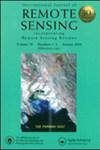一种用于遥感场景分类的轻量级跳接扩展起始网络
IF 1.5
4区 地球科学
Q3 IMAGING SCIENCE & PHOTOGRAPHIC TECHNOLOGY
引用次数: 0
摘要
遥感图像(RSI)场景分类是遥感领域的一个热点问题,受到了广泛的关注。图像分类的关键问题是有效地理解语义内容。卷积神经网络(cnn)由于其强大的特征提取能力,被普遍认为可以显著提高分类性能。然而,该模型整体结构复杂,参数众多,难以提取更有效的特征。为了解决这些问题,在本文中,我们提出了一个轻量级的跳过连接的扩展Inception网络,称为SEINet。为了在更细粒度的级别上捕获特征,我们基于现有的网络架构创建了一个具有更少参数的新的轻量级骨干网络。此外,本文还介绍了一个用于提取上下文相关关系的跨连接扩展启始(SEI)模块。烧蚀实验验证了该模块的有效性。在两个公共数据集上的实验结果表明,我们的方法在分类精度和执行效率方面优于最先进的SOTA方法。关键词:遥感场景分类卷积神经网络(CNN)跳接扩展初始披露声明作者未报告潜在的利益冲突。本文章由计算机程序翻译,如有差异,请以英文原文为准。
A lightweight skip-connected expansion inception network for remote sensing scene classification
ABSTRACTRemote sensing image (RSI) scene classification is a hot topic in the field of remote sensing and has garnered a lot of attention. The key issue in image classification is effectively understanding semantic content. Convolutional neural networks (CNNs) are generally recognized to significantly improve classification performance due to their powerful feature extraction capabilities. However, the overall structure of the model is complicated and has a large number of parameters, making it difficult to extract more efficient features. To address these problems, in this paper, we propose a lightweight skip-connected expansion Inception network called SEINet. To capture characteristics at a more granular level, we create a new lightweight backbone network with fewer parameters based on the existing network architecture. Additionally, the paper introduces a skip-connected expansion Inception (SEI) module for extracting context-dependent relationships. The ablation experiments verify the effectiveness of our proposed module. Experiment findings on two public datasets demonstrate that our method has advantages in classification accuracy and execution efficiency over state-of-the-art (SOTA) methods.KEYWORDS: Remote sensingscene classificationconvolution neural network (CNN)skip-connected expansion Inception Disclosure statementNo potential conflict of interest was reported by the author(s).
求助全文
通过发布文献求助,成功后即可免费获取论文全文。
去求助
来源期刊

Remote Sensing Letters
REMOTE SENSING-IMAGING SCIENCE & PHOTOGRAPHIC TECHNOLOGY
CiteScore
4.10
自引率
4.30%
发文量
92
审稿时长
6-12 weeks
期刊介绍:
Remote Sensing Letters is a peer-reviewed international journal committed to the rapid publication of articles advancing the science and technology of remote sensing as well as its applications. The journal originates from a successful section, of the same name, contained in the International Journal of Remote Sensing from 1983 –2009. Articles may address any aspect of remote sensing of relevance to the journal’s readership, including – but not limited to – developments in sensor technology, advances in image processing and Earth-orientated applications, whether terrestrial, oceanic or atmospheric. Articles should make a positive impact on the subject by either contributing new and original information or through provision of theoretical, methodological or commentary material that acts to strengthen the subject.
 求助内容:
求助内容: 应助结果提醒方式:
应助结果提醒方式:


